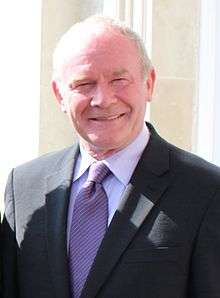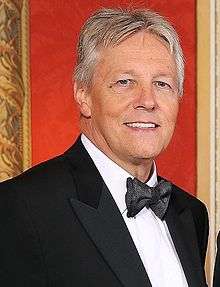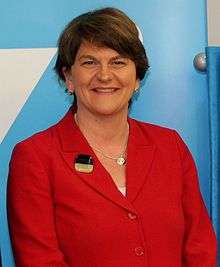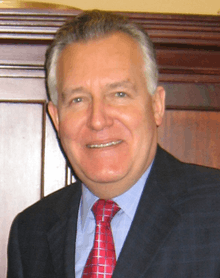First Minister and deputy First Minister
| First Minister and deputy First Minister of Northern Ireland | |
|---|---|
| Appointer | Northern Ireland Assembly |
| Term length | At the discretion of the single largest party in each of the two largest community designations within the Northern Ireland Assembly |
| Inaugural holder | |
| Formation | 1 July 1998 |
| Salary | |
| Website | www.ofmdfmni.gov.uk |
The First Minister and deputy First Minister are the joint heads of the Northern Ireland Executive and have overall responsibility for the running of the Executive Office.
The two positions have the same governmental power; despite the name, the deputy First Minister is not subordinate to the First Minister. Created under the terms of the 1998 Good Friday Agreement, both were initially nominated and appointed by members of the Northern Ireland Assembly on a joint ticket by a cross-community vote, using consociational principles. That process was changed following the 2006 St Andrews Agreement, meaning that the First Minister and deputy First Minister are now nominated separately by the largest parties in each of the two largest community designations in the assembly. The incumbents are Arlene Foster of the Democratic Unionist Party as First Minister and Martin McGuinness of Sinn Féin as deputy First Minister.
Responsibilities
 |
| This article is part of a series on the politics and government of Northern Ireland |
|
Northern Ireland in the EU |
The First Minister and deputy First Minister share equal responsibilities within government, and their decisions are made jointly. The First Minister is, though, the first to greet official visitors to Northern Ireland and shares the same title as their counterparts in Scotland and Wales.
Specifically, they are tasked with co-chairing meetings of the Northern Ireland Executive, "dealing with and co-ordinating" the work of the Executive, and the response of the administration to external relationships.[2]
The First Minister and deputy First Minister agree the agenda of Executive meetings[3] and can jointly determine "significant or controversial matters" to be considered by the Executive.[4]
The ministers' policy responsibilities include:[5]
- economic policy
- equality before the law
- European Union issues
- human rights
- the machinery of government (including the Ministerial Code)
- public appointments policy
- standards in public life
Two junior ministers assist the First Minister and deputy First Minister in carrying out the work of OFMDFM.[6] They are jointly accountable to the First Minister and deputy First Minister. The incumbent junior ministers are Jonathan Bell (Democratic Unionist Party) and Jennifer McCann (Sinn Féin).
Election
As originally established under the Northern Ireland Act 1998, the First Minister was elected by the Assembly on a joint ticket with the deputy First Minister through a cross-community vote. It was created to enable the leaders of the main unionist and nationalist parties to work together, with guaranteed joint representation of both main communities. For the purposes of a cross-community vote, MLAs were designated as unionist, nationalist or other.
The nominees for First Minister and deputy First Minister required the support of:
- a majority of the members voting in the election;
- a majority of the designated unionists voting; and
- a majority of the designated nationalists voting.[7]
This procedure was used on 2 December 1999 to elect David Trimble (Ulster Unionist Party, UUP) and Seamus Mallon (Social Democratic and Labour Party, SDLP). Following several suspensions of the Northern Ireland Executive, Trimble was not re-elected on 2 November 2001 due to unionist opposition. He was subsequently re-elected alongside Mark Durkan (SDLP) on 6 November 2001; on that occasion, three Alliance Party of Northern Ireland members redesignated from 'other' to 'unionist' to support Trimble's nomination.[8]
Following the St Andrews Agreement in October 2006, this procedure was changed to allow for:
- a First Minister nominated by the largest party of the largest designation;[9]
- a deputy First Minister nominated by the largest party of the second largest designation.[10]
This procedure, which removed the need for a joint ticket between the Democratic Unionist Party and Sinn Féin, was used to appoint Ian Paisley and Martin McGuinness on 8 May 2007. It was again used to appoint Peter Robinson (DUP) alongside Martin McGuinness on 5 June 2008 and again on 12 May 2011; and to appoint Arlene Foster (DUP) alongside Martin McGuinness on 11 January 2016.
However, if the largest party of the largest designation (currently the DUP) were not the largest party overall, the appointment procedure would be as follows:
- a First Minister nominated by the largest party;
- a deputy First Minister nominated by the largest party of the largest designation.[11]
The Minister of Justice is now the only Northern Ireland Executive Minister elected on a cross-community vote. All other ministers are party appointees.[12]
Vacancy
The First Minister or deputy First Minister may also appoint another Northern Ireland Executive Minister to exercise the functions of the office during a vacancy; currently for a continuous period up to six weeks.[13][14]
Vacancies have occurred on four occasions to date:
- First Minister
- Sir Reg Empey for David Trimble (1 July 2001 – 6 November 2001)
- Arlene Foster for Peter Robinson (11 January 2010 – 3 February 2010)
- Arlene Foster for Peter Robinson (10 September 2015 – 20 October 2015)
- deputy First Minister
- John O'Dowd for Martin McGuinness (20 September 2011 – 31 October 2011)
Terminology
Titles in Ulster Scots
Various ways of translating the titles "First Minister and deputy First Minister" into the Ulster Scots dialects have been attested in official communications, including Heid Männystèr an tha Heid Männystèr depute, First Meinister an First Meinister depute,[15][16] First Meenister an First Meenister depute[17] and First Minister an First Minister depute.[18]
Capitalisation of "deputy"
The second position has been spelt "Deputy" or "deputy" First Minister, due to differing preferences by civil servants (and potentially ministers), although the spelling of the title has no constitutional consequences in practice.
The first two holders of the office, Seamus Mallon and Mark Durkan, were both referred to during their periods of office as "Deputy First Minister", with a capital D. This version was also adopted in 1999 for the logo of the OFMDFM. Several weeks after Martin McGuinness took up office as Deputy First Minister in 2007, civil servants in his department began asking the Assembly's Hansard team to replace the capital D with a lower-case d, pointing out that the title was spelled this way in the Northern Ireland Act 1998, the legislation which established the office. Some believe that the case was changed to highlight the fact that the position holds the same power as the position of First Minister, but a spokesman for McGuinness said that neither McGuinness nor his advisers had asked for the change. Speaker William Hay ordered the change and the capital D was dropped from Hansard references.
Officials edited the department's archive of press releases to make that change (despite its use by Mallon and Durkan when in office) but the capital D still appears in some places, and a spokesman confirmed on 20 March 2008 that the office had "no plans" to change the OFMDFM logo. However, the Assembly committee that scrutinises their work is now listed as the "Committee for the Office of the First Minister and deputy First Minister". Ultimately it was decided that McGuinness should be the deputy First Minister, unless all the other letters in the title are in capitals. Confusion isn't completely resolved however; if McGuinness writes to the Assembly committee that scrutinises his work, his note will have a letterhead that comes from the Office of the First Minister and Deputy First Minister, but he'll get a reply back from the Committee for the Office of the First Minister and deputy First Minister.[19]
In official language, the positions are sometimes abbreviated to FM/dFM,[20]
"Joint First Minister" and "Co-First Minister"
Sinn Féin started using the phrases Joint First Minister and Co-First Minister in 2009 to describe the deputy First Minister to highlight the fact that the First Minister and deputy First Minister operated in tandem. Martin McGuinness used the term Joint First Minister himself when he arrived for a meeting of the North/South Ministerial Council in February 2009; the DUP denounced the term as "republican speak" and it is not used in legislation.[21][22] Jim Allister, the leader of the Traditional Unionist Voice, has long been calling Robinson and McGuinness "the joint first ministers", to highlight the joint nature of the office and to demonstrate his opposition to the power-sharing arrangements.[21]
History

Following a referendum on the Belfast Agreement on 23 May 1998 and subsequent the Northern Ireland Act 1998, the Northern Ireland Assembly was established in 1998 with a view to assuming devolved powers from the Westminster Parliament. On 1 July 1998, David Trimble (UUP) and Seamus Mallon (SDLP) were nominated and elected First Minister and Deputy First Minister designates respectively. Eventually, on 2 December 1999, power was devolved and Trimble and Mallon formally took office as joint heads of the Northern Ireland Executive.
On 6 November 2001, Mark Durkan (SDLP) became Deputy First Minister after Seamus Mallon's retirement. The Executive and the two positions were suspended between 15 October 2002 and 8 May 2007 following a breakdown in trust between the parties.
On 8 May 2007, Ian Paisley (DUP) and Martin McGuinness (Sinn Féin) were nominated and appointed First Minister and Deputy First Minister respectively in line with the announcement by their two parties on 26 March 2007.
Paisley announced his intention to resign on 4 March 2008.[23] His deputy as DUP leader, Peter Robinson was ratified as Democratic Unionist Party leader designate on 17 April 2008[24] and took office in that role on 31 May 2008. As leader-designate of the largest designated unionist party in the Northern Ireland Assembly he was also in effect the First Minister designate and became First Minister on 5 June 2008. Arlene Foster succeeded Peter Robinson as DUP leader on 18 December 2015, and as First Minister on 11 January 2016.[25]
Separately, between 12 February 2000[26] and 30 May 2000,[27] and 15 October 2002[28] and 8 May 2007,[29] however, devolution was suspended, and along with it the offices of First Minister and deputy First Minister. The Office of the First Minister and deputy First Minister became the responsibility of the Secretary of State for Northern Ireland. There were also two 24-hour periods of suspension on 11 August 2001[30][31] and 22 September 2001.[32][33] to allow timetables for negotiation to restart.[34]
First Ministers and deputy First Ministers
- Parties
Ulster Unionist Party Social Democratic and Labour Party Democratic Unionist Party Sinn Féin
| First Minister (Birth–Death) Constituency |
Portrait | Term of office | Elected | Government | Deputy First Minister (Birth–Death) Constituency |
Portrait | Term of office | ||||
|---|---|---|---|---|---|---|---|---|---|---|---|
| David Trimble (born 1944) MLA for Upper Bann |
 |
1 July 1998 |
1 July 2001 |
1998 | First Executive UUP – SDLP – DUP – Sinn Féin |
Seamus Mallon (born 1936) MLA for Newry and Armagh |
 |
1 July 1998 |
6 November 2001 | ||
| Reg Empey (born 1947) MLA for Belfast East |
|
1 July 2001 |
6 November 2001 |
— | |||||||
| David Trimble (born 1944) MLA for Upper Bann |
 |
6 November 2001 |
14 October 2002 |
— | Mark Durkan (born 1960) MLA for Foyle |
 |
6 November 2001 |
14 October 2002 | |||
| Assembly suspended from 15 October 2002 to 8 May 2007 | |||||||||||
| Ian Paisley (1926–2014) MLA for North Antrim |
 |
8 May 2007 |
5 June 2008 |
2007 | Second Executive DUP – Sinn Féin – UUP – SDLP – Alliance from 2011 |
Martin McGuinness (born 1950) MLA for Mid Ulster |
 |
8 May 2007 |
20 September 2011 | ||
| Peter Robinson (born 1948) MLA for Belfast East |
 |
5 June 2008 |
11 January 2010 |
— | |||||||
| Arlene Foster (born 1970) MLA for Fermanagh and South Tyrone |
 |
11 January 2010 |
3 February 2010 |
— | |||||||
| Peter Robinson (born 1948) MLA for Belfast East |
 |
3 February 2010 |
10 September 2015 |
— | |||||||
| 2011 | Third Executive DUP – Sinn Féin – UUP until 2015 – SDLP – Alliance | ||||||||||
| — | John O'Dowd (born 1967) MLA for Upper Bann |
 |
20 September 2011 |
31 October 2011 | |||||||
| — | Martin McGuinness (born 1950) MLA for Mid Ulster |
 |
31 October 2011 |
Incumbent | |||||||
| Arlene Foster (born 1970) MLA for Fermanagh and South Tyrone |
 |
10 September 2015 |
20 October 2015 |
— | |||||||
| Peter Robinson (born 1948) MLA for Belfast East |
 |
20 October 2015 |
11 January 2016 |
— | |||||||
| Arlene Foster (born 1970) MLA for Fermanagh and South Tyrone |
 |
11 January 2016 |
Incumbent | 2016 | Fourth Executive DUP – Sinn Féin | ||||||
Acting First Ministers
During the periods of suspension, the Secretaries of State for Northern Ireland assumed the responsibilities of the First Minister and deputy First Minister in their temporary roles as Acting First Minister of Northern Ireland.
| Name | Photo | Party | Since | Until | PM | ||
|---|---|---|---|---|---|---|---|
| John Reid |  |
Labour | 14 October 2002 (25 January 2001 as Secretary) |
24 October 2002 | Tony Blair | ||
| Paul Murphy |  |
Labour | 24 October 2002 | 6 May 2005 | |||
| Peter Hain |  |
Labour | 6 May 2005 | 8 May 2007 (27 June 2007 as Secretary) | |||
Living Former First Ministers and deputy First Ministers
There are two living former first ministers and two living former deputy first ministers, not including those who served as acting:
|
First Ministers
|
Deputy First Ministers
|
See also
- Office of the First Minister and deputy First Minister
- Northern Ireland Executive
- Junior Minister (Northern Ireland)
- List of government ministers in Northern Ireland
References
- ↑ "Members' Salaries 2013-2014". Members' Expenses. Northern Ireland Assembly. Retrieved 20 June 2015.
- ↑ "Section 2.2". Ministerial Code. Northern Ireland Executive. Retrieved 18 October 2011.
- ↑ "Section 2.11". Ministerial Code. Northern Ireland Executive. Retrieved 18 October 2011.
- ↑ "Section 2.3 (vii)". Ministerial Code. Northern Ireland Executive. Retrieved 18 October 2011.
- ↑ "Section 2.4". Ministerial Code. Northern Ireland Executive. Retrieved 18 October 2011.
- ↑ Section 19, Northern Ireland Act 1998
- ↑ Section 16(3), Northern Ireland Act 1998 (as enacted)
- ↑ "Scuffles as Trimble re-elected". BBC News. 6 November 2001. Retrieved 20 October 2011.
- ↑ Section 16A(4), Northern Ireland Act 1998 (as amended)
- ↑ Section 16A(5), Northern Ireland Act 1998 (as amended)
- ↑ Section 16C(6), Northern Ireland Act 1998 (as amended)
- ↑ Section 21A(3A), Northern Ireland Act 1998 (as amended)
- ↑ Section 16(5), Northern Ireland Act 1998 (as enacted)
- ↑ Section 16A(11), Northern Ireland Act 1998 (as amended)
- ↑ North/South Ministerial Council: 2011 Annual Report, Ulster Scots
- ↑ North-South Ministerial Council: 2010 Annual Report, Ulster Scots
- ↑ North/South Ministerial Council: 2009 Annual Report, Ulster Scots
- ↑ North/South Ministerial Council: 2008 Annual Report, Ulster Scots
- ↑ Martin's D-lemma: lowering the case of the minister's title took top aides weeks Belfast Telegraph, 21 March 2008
- ↑ "Letter from the First Minister and deputy First Minister". First Report on the Arrangements for the Devolution of Policing and Justice Matters. Northern Ireland Assembly. 18 November 2008. Retrieved 5 December 2011.
- 1 2 Are all things created equal? BBC News, 17 February 2009
- ↑ Our conjoined ministers BBC News - The Devenport Diaries, 19 February 2009
- ↑ Paisley to quit as first minister BBC News, 4 March 2008
- ↑ Robinson confirmed as DUP leader BBC News, 17 April 2008
- ↑
- ↑ Northern Ireland Act 2000 (Commencement) Order 2000 S.I. 2000/396.
- ↑ Northern Ireland Act 2000 (Restoration of Devolved Government) Order 2000 2000/1446.
- ↑ Northern Ireland Act 2000 (Suspension of Devolved Government) Order 2002 S.I. 2002/2574
- ↑ The Northern Ireland Act 2000 (Restoration of Devolved Government) Order 2007 S.I. 2007/1397.
- ↑ Northern Ireland Act 2000 (Suspension of Devolved Government) Order 2001 S.I. 2001/2884.
- ↑ Northern Ireland Act 2000 (Restoration of Devolved Government) Order 2001 S.I. 2001/2895.
- ↑ Northern Ireland Act 2000 (Suspension of Devolved Government) (No.2) Order 2001 S.I. 2001/3230.
- ↑ Northern Ireland Act 2000 (Restoration of Devolved Government) (No.2) Order 2001 S.I. 2001/3231.
- ↑ "Northern Ireland chronology: 2001". BBC News. 9 April 2003. Retrieved 15 March 2011.

